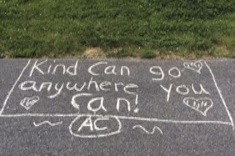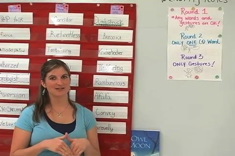Upon the completion of each school year, I always have the same feeling: I want to start over again right away so that this time I might get things “right.” Of course this is impossible, but there are always things I want to try, things to do better, and things I want to make sure to never do again.
This spring from mid-April to June was a lot of fun in our classroom. We read and wrote poetry and participated in Poem in Your Pocket Day. We did a fun mini-unit on folklore and mythology, including many read-alouds and, of course, watching Disney’s Hercules. We had a special day dedicated to blueberries! Wild blueberries are important to Maine’s economy, so everyone wore blue; we had a speaker, read blueberry stories, and sampled some blueberry treats. The students also loved researching a country, creating a slide show or a skit, and presenting them to the class. We took advantage of the warm weather and read outside, and had field day and a field trip. You get the idea: springtime is a lot of fun.
The last two weeks of school were especially relaxed. Our major projects were completed and all the assessments were done. We had long, unhurried reading sessions and planned our reading summers. We did some readers theater, which the students enjoyed very much. While we were writing our six-word memoirs outside in sidewalk chalk, one student remarked, “This is the best week of the whole year!” Although this statement made me smile, it also filled me with regret. These weeks had been fun, and the students were still reading, writing, and learning. But what about August through March? Sure, we had fun events such as our Diary of a Wimpy Kid release party, the Global Read Aloud, and Skyping with Laurel Snyder on World Read Aloud Day. But there was a lot of time between some of those events. After hearing my student’s declaration, I immediately began thinking about how I could spread the “fun” events and activities throughout the year.
Don’t get me wrong, I do not believe that every day in the classroom has to be a carnival, but having some different, enjoyable, and interesting activities and events at school makes students more excited to learn and improves their motivation. It is also just a break from the usual, which can be a welcome change for everyone. One change I have planned is to spread the fun activities throughout the school year. I also know that many events take a lot of work, and quite honestly we all have too much to do already. So here are some very simple ideas for the classroom that will offer a slight break from the norm, but will keep a focus on reading and writing without lots of extra work.
Take a unit that is especially interesting to your students and make it a longer unit or something you do throughout the year.
In the spring the most interesting units for my students are those on poetry and folklore/mythology. I plan to take both topics and make them yearlong units of study, weaving them into minilessons, read-alouds, reading groups, and writing activities.
Change the location of a common activity.
My students love to read in our library or outside. Sometimes we write in our commons room or computer lab.
Invite visitors into the classroom.
Students can get tired of listening to the same teacher day after day. Inviting guest readers and speakers can keep things fresh. My students also LOVED the times when we Skyped with other classrooms and with authors.
Use technology more.
Most students are motivated to use technology, and it usually makes an activity feel like more fun. We made slide shows and presentations, but this year I also plan to have students make book trailers using online tools.
Involve art, music, and drama.
Take an activity or unit you already teach, and try to weave in a few activities that involve the arts. Add a song, art activity, or play. My students loved doing readers theater last spring. This is something I hope to sprinkle in more regularly.
Theme Days
I realize that theme days are common in the early elementary grades but not always in grades three and up. Having a theme day can add just the right amount of something different to a school day. I have to admit that I am not a huge fan of having lots of big theme days that include costumes, props, and snacks. Sure, these are fun occasionally, but having them too often can be overwhelming. I like themes that are small and where the focus is still on learning. Choose a theme, find a read-aloud or two and a reading and/or a writing activity centered on it, and you’ve got yourself a theme day. Of course you can go as crazy as you want. Here are a few simple theme ideas to get you started.
*Picture-book day
*Sports day
*Animal day
*Your-state day
*Color days
*Celebrate-an-author day
*Book-release day (Celebrate a new book in a favorite series or by a favorite author.)
*All-about-me day
*Wear-a-vocabulary-word day
*Celebrate-a-book-series day
*Take any science or social studies topic and make it a theme day.
*Host a “marathon.” Reading or writing marathons add a bit of fun to activities students will be doing anyway. Set aside a specific amount of time for dedicated, uninterrupted reading and/or writing. Students can dress in activewear, and it’s fun to invite some visitors. Medals and ribbons are optional.
Then of course there are the bigger events that we can celebrate throughout the year, such as Read Across America, World Read Aloud Day, the Global Read Aloud, International Dot Day, and Poem in Your Pocket Day, to name a few. These bigger events keep literacy in the spotlight in schools and show students that reading and writing are valued and should be celebrated.





